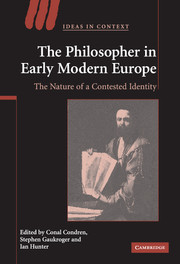Book contents
- Frontmatter
- Contents
- List of contributors
- Acknowledgements
- Introduction
- 1 The persona of the natural philosopher
- 2 The university philosopher in early modern Germany
- 3 The persona of the philosopher and the rhetorics of office in early modern England
- 4 From Sir Thomas More to Robert Burton: the laughing philosopher in the early modern period
- 5 Hobbes, the universities and the history of philosophy
- 6 The judicial persona in historical context: the case of Matthew Hale
- 7 Persona and office: Althusius on the formation of magistrates and councillors
- 8 Descartes as sage: spiritual askesis in Cartesian philosophy
- 9 The natural philosopher and the virtues
- 10 Fictions of a feminine philosophical persona: Christine de Pizan, Margaret Cavendish and philosophia lost
- 11 John Locke and polite philosophy
- Index
- IDEAS IN CONTEXT
10 - Fictions of a feminine philosophical persona: Christine de Pizan, Margaret Cavendish and philosophia lost
Published online by Cambridge University Press: 06 November 2009
- Frontmatter
- Contents
- List of contributors
- Acknowledgements
- Introduction
- 1 The persona of the natural philosopher
- 2 The university philosopher in early modern Germany
- 3 The persona of the philosopher and the rhetorics of office in early modern England
- 4 From Sir Thomas More to Robert Burton: the laughing philosopher in the early modern period
- 5 Hobbes, the universities and the history of philosophy
- 6 The judicial persona in historical context: the case of Matthew Hale
- 7 Persona and office: Althusius on the formation of magistrates and councillors
- 8 Descartes as sage: spiritual askesis in Cartesian philosophy
- 9 The natural philosopher and the virtues
- 10 Fictions of a feminine philosophical persona: Christine de Pizan, Margaret Cavendish and philosophia lost
- 11 John Locke and polite philosophy
- Index
- IDEAS IN CONTEXT
Summary
Twentieth-century analytic philosophy has tended to gloss over historical research into the late medieval period and to accept with little criticism an Enlightenment account of the history of ideas. This history posits an uninterrupted progress in ideas from the Enlightenment to the present, with each step representing an advance toward the modern ideal of philosophical inquiry. Analytic feminist philosophers have not been immune to this worldview. In the 1970s, feminism was at first represented as a completely new progressive phenomenon. Soon, however, research into the nineteenth-century women's movement led to it being called ‘second-wave feminism’. Further research pushed our knowledge of women's engagement with issues such as women's rights and women's exclusion from education back to before the French Revolution. But the assumption remained that feminism had its intellectual origins in the progress of men's ideas – in liberalism or socialism or at least in Enlightenment thought. The history of feminism, in other words, was interpreted teleologically in terms of an advance toward our current philosophical concerns, such as abstract individualism, rights-based theory, contractarian ethics, and so on. The modern focus on women's equal rationality, in particular, is thought to have originated with Cartesian philosophy. After Descartes, a common story goes, the doors of our minds were opened to a new critical spirit that spelled the death of Aristotelianism.
- Type
- Chapter
- Information
- The Philosopher in Early Modern EuropeThe Nature of a Contested Identity, pp. 229 - 253Publisher: Cambridge University PressPrint publication year: 2006

